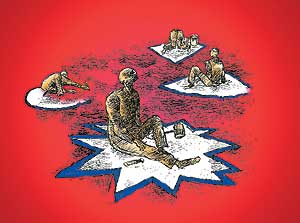 Wonder if Aung San Suu Kyi knows what's in store for her. After the euphoria of democracy is over, will she discover like we did that fighting for freedom is in some ways easier than making it work? Will people power fail its ultimate test of putting in people in office who will make the difference to the lives of citizens?
Wonder if Aung San Suu Kyi knows what's in store for her. After the euphoria of democracy is over, will she discover like we did that fighting for freedom is in some ways easier than making it work? Will people power fail its ultimate test of putting in people in office who will make the difference to the lives of citizens? It's called the Musharraf Syndrome. And it afflicts all who blame freedom for poverty and political mismanagement. Singapore's Lee Kwan Yew once went to the Philippines and lectured the Filipinos that they remained poor because they were free. In a soft state, he said, democracy needs to be guided-especially in its formative years. Laws and values need to be put into place that will institutionalise sharing resources for the common good, creating equal opportunities even if economic equality is not possible. The surprising thing was that a lot of Filipinos agreed, just as Pakistanis fed up with Nawaz and Benazir rationalised their praetorian intervention.
Here, too, there is flippant talk these days about subcontracting this country off to Elder Statesman Lee so he can make us in the image of his city state. After a couple of chhota pegs others have even been overheard to say: "Someone needs to do a Musharraf."
Things are bad, yes. And this leads many to the authoritarian temptation. Paradoxically, it is a temptation that seems to strike not the rulers so much as the ruled. Citizens in many juvenile democracies have lost faith in their flighty leaders. They look for a relatively easy and (they hope) painless way out, and are nostalgic for the "certainties" of strongman rule. Some Russians are pining for Stalin, there has been a renaissance of former communists in the ex-Soviet bloc.
As democracy falters, extremists move to fill the governance vacuume. Foreseeing conflict and anarchy, the people then regard a return to authoritarianism as a lesser evil. It is a search for a saviour that is borne out of desperation and extreme disillusionment with those who have misused and wasted the popular mandate. This is the seduction of authoritarianism: a psychological syndrome to which those who live in decaying democracies are prone.
The giddiness with which we greeted the restoration of democracy has long given way to apathy and cynicism. In fact, somewhere along the way, we got complacent and forgot that democracy isn't a trophy to lock up inside a glass cabinet. Democracy is like a rubber band, you have to stretch it to make it work.
But that means having an alert citizenry, a pro-active civil society, a media that flexes itself and takes freedom to its limit. But that takes hard work. It is much easier to point out what is wrong than to do something to set things right. It is a lot less effort to be cynical. All this has brought us to a point where it is now fashionable to invoke Lee Kwan Yew or Musharraf. Such talk is infectious, and it has paralysed us with low self-esteem and fatalism.
When democracy is threatened as it is now by those who want to usher in a dictatorship of the proletariat, we need to strengthen democracy, not dismantle it. If democracy did not work it was because it was misused, not because there was something inherently wrong with it. The antidote to a faltering democracy is its more sincere and honest application, and a citizenry that forces its elected leaders to display more accountability and commitment. At no point is this more important than when conflict threatens our freedoms.


